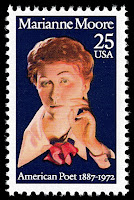Marianne Moor published the first version of 'Poetry' in 1919 and revised it many times for the next six decades. Employing the techniques of modernist poetry, Moore expands her idea of writing and reading poetry. In the poem, she differentiates genuine poetry from poetry produced by half poets and rejects existing ideas on poetic compositions and declares that genuine poetry can be produced on any mundane topics.
Pages
Saturday, 1 October 2022
Litmosphere - Summary of Poetry by Marianne Moore
Litmosphere - Text and Glossary of Poetry by Marianne Moore
Poetry
Marianne Moore (1887-1972)
I too,
dislike it: there are things that are important beyond all this fiddle.
Reading it, however, with a perfect contempt for it, one discovers
that there is in
it after all, a place for the genuine.
Hands that can grasp, eyes
that can dilate, hair that can rise
if it must, these things are
important not because a
high-sounding
interpretation can be put upon them but because they are
useful; when they become so derivative as to become
unintelligible, the
same thing may be said for all of us—that we
do not admire what
we cannot understand. The bat,
holding on upside down or in
quest of something to
eat,
elephants pushing, a wild horse taking a roll, a tireless wolf under
a tree, the immovable critic twinkling his skin like a horse that
feels a flea, the base—
ball fan, the statistician—case after case
could be cited did
one wish it; nor is it valid
to discriminate against
“business documents and
school-books”;
all these phenomena are important. One must make a distinction
however: when dragged into prominence by half poets, the result is
not poetry,
nor till the autocrats among us can be
“literalists of
the imagination”—above
insolence and triviality and
can present
for
inspection, imaginary gardens with real toads in them, shall we have
it. In the meantime, if you demand on the one hand, in defiance of
their opinion—
the raw material of poetry in
all its rawness, and
that which is on the other hand,
genuine, then you are
interested in poetry.
Glossary
Fiddle: the noun
fiddle has three implications here. The first is, fiddle is a musical instrument
which evokes pleasure. Poetry too is like fiddle which pleases its readers.
Second is, fiddle refers to fidgeting with something in a restless way. The process
of writing a poem involves a lot of fidgeting. Thirdly, fiddle also refers to
small sum; in this sense the speaker refers to poetry as something worthless.
Line 4-6: The speaker
describes various physical responses poetry is capable of producing such as hands
grasping, eyes dilating and hair rising.
high-sounding
interpretation: this refers to criticism which often present literature
in high sounding interpretation.
Line 11-19:
the speaker
offers a detailed list of raw materials which can poetry.
literalist of the imagination: this phrase is drawn
from of W B Yeats' remarks about William Blakes. A literalist uses language to create a lifelike
object in the readers imagination. Similarly. A poet is a literalist of
imagination who stirs the imagination through precise, evocative imagery.
Imaginary
gardens with real toads in them: the speaker states genuine poets are capable of
creating imaginary gardens in the mind of readers with real -producing effects
of the real-toads in it.
Line
26-30: the speaker of the poem reaffirms that the two ingredients
for real poetry is genuine raw materials, that is genuine language and form.

